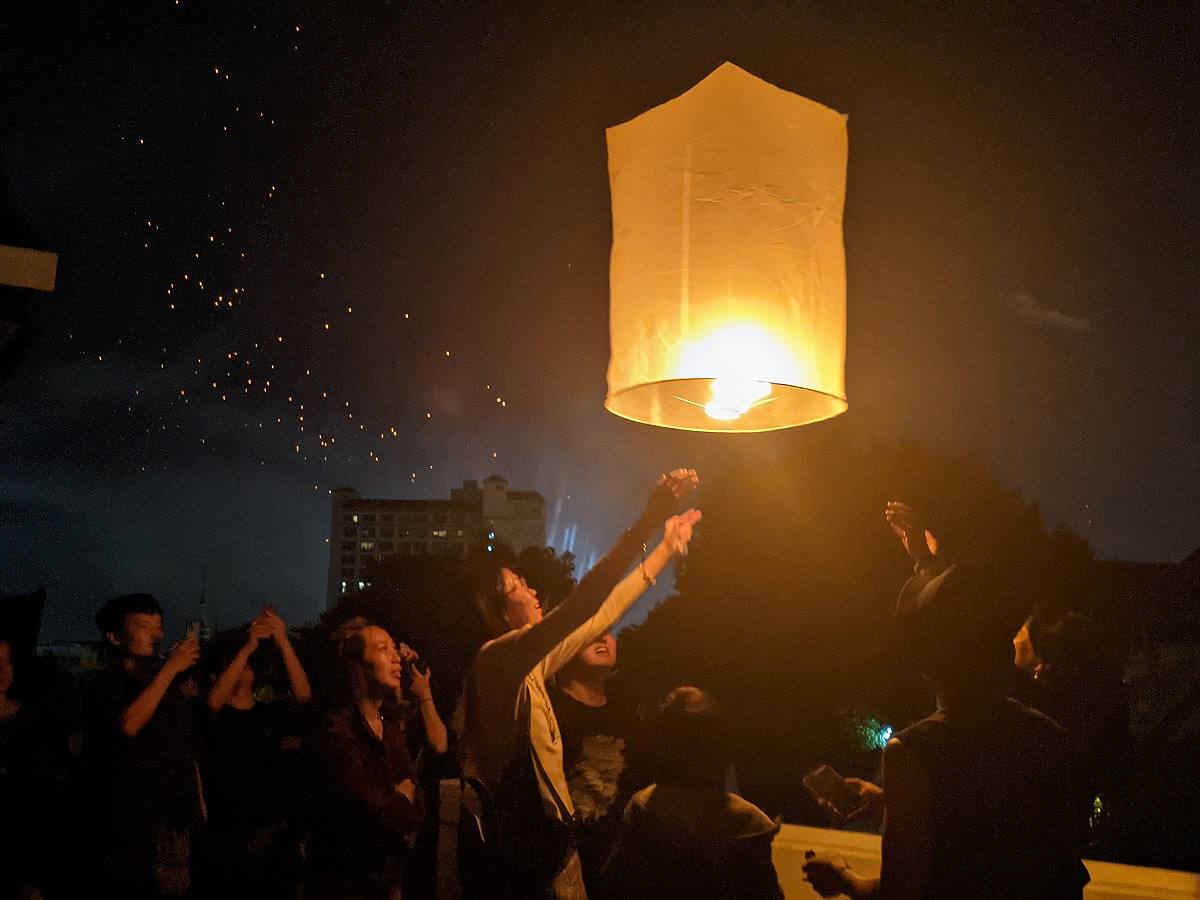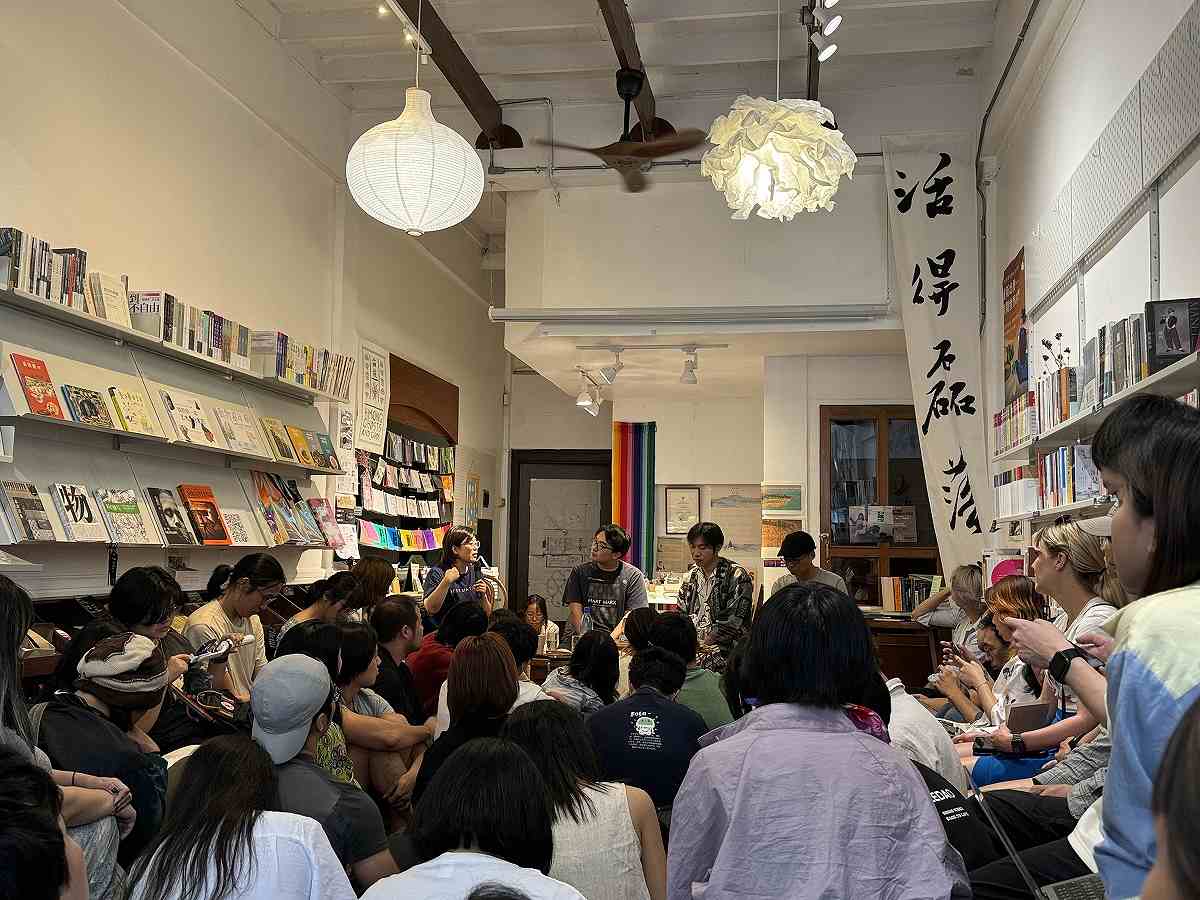
Young Chinese set off lanterns to welcome the new year in Chiang Mai.
16:02 JST, February 10, 2024
CHIANG MAI, Thailand – There are the hipsters cramped by big-city life, the tech bros pumped about the internet of tomorrow, and idealistic parents wary of China’s hyper-intensive schools, and then there are the stoners. This backpacker town in the mountains of northern Thailand has become the destination of choice for a slew of Chinese seeking respite from the increasingly repressive Communist Party at home.
Huge billboards advertise international schools and mansions in Chinese characters. A Chinese-language menu is on offer at nearly every cafe, restaurant and weed store in the old town. There are Mandarin-speaking doctors, delivery drivers and police officers. The stalls at the night markets accept Chinese digital payment apps.
That’s because many of these Chinese arrivals are not just passing through. They’ve come to stay.
“Back home in China, many feel exploited and restricted as if they were cash crops in a big plantation,” said Gloria Yafan Niu, a researcher at Chiang Mai University who studies migration and gender and has lived here since 2018. “But here in Chiang Mai, you just do you and be a tree or a reed or a flower, and find a balanced life with relatively low cost and high quality.”
As freedoms – of expression, of thought, of association – have steadily been eroded in China since Xi Jinping took control of the country just over a decade ago, freethinking Chinese have looked for havens of intellectual exile. For a while, that place was Dali, the town in southwestern China that became known as “Dalifornia” because of its stunning landscape, burgeoning tech scene and tradition of relative tolerance.
But these days, even Dali is becoming inhospitable for digital nomads and burned-out urbanites, their suspected techno-anarchic tendencies drawing unwelcome scrutiny. That means many people are continuing farther south, to Chiang Mai.
Here, they sound out new ideas, embrace various countercultures and build communities considered undesirable in China under Xi, a strongman leader who has asserted Chinese Communist Party control across society.
“When I turned on television, opened newspapers or browsed social media in China, all I heard was one person talking,” said Pu Jianchuan, a 50-year-old stock broker and bitcoin investor, referring to Xi. “It was chilling.”
Xi was “closing the door” to the world, said Pu, who moved here early last year and now lives in a villa on the outskirts of Chiang Mai, citing the harsh Shanghai “zero covid” lockdown and draconian crackdowns on tech giants, tutoring and cryptocurrency.
Thailand’s warm climate, easygoing charm and relaxed visa regime has long appealed to Chinese tourists. But starting in 2022, as China’s covid lockdowns dragged into a third year, the tropical country took on new allure for those wanting to run away from a difficult situation at home.
That year, 110,000 Chinese nationals applied for long-term Thailand visas – twice as many as the year before, according to an analysis of Thai immigration data.
That has surged further since Thailand granted visa-free entry to Chinese citizens in September.
Some are from the wealthy elite that decided to relocate away from China’s coronavirus restrictions. But many are young, middle-class and educated. There are digital nomads, artists and chefs who came on a whim and a shoestring.
They cite all sorts of reasons for making the move, but there is usually a push of concern about the situation at home combined with the pull of free, easy and relatively cheap living. Many don’t know when or whether they will leave.
– – –
Tech and techno
On the final evening of 2023, an alley just outside Chiang Mai’s old town, with its red-brick walls and moat, was heaving with young Chinese singing and dancing in the new year.
A Chinese DJ played techno to a crowd sipping made-in-China craft beers. The smell of cannabis wafted through the air as tech workers from Shanghai and Shenzhen attempted TikTok dances.
The New Year’s Eve party was organized to mark the end of Wamotopia, half tech-conference, half-carnival, which – like many of those present – moved from Dali to Chiang Mai. More than 500 people – engineers, entrepreneurs and designers; blockchain developers, digital marketers and spiritual gurus – for two weeks of intense discussions in Chinese and carefree partying.
They came to hang out, sure, but also for the panels about how to imagine then create a better future – something the techie-dominated crowd often ruled was best achieved using next-generation decentralized technology.
Wamotopia “is not political,” said Lin, an organizer in his mid-20s who spoke on the condition that only his surname be used to avoid reprisals from Chinese authorities. “We are not opposing anyone.”
But the stifling political environment in China was an undercurrent in discussions, during which Xi and his policies were rarely far from people’s minds. One invite-only session was billed as group therapy for people traumatized by China’s lockdowns and persecution of protesters.
Lin, when joking about the challenge of herding a decentralized group with no leader, appropriated a Xi quote. “I’m ready to ‘put aside my own well-being for the good of my people,’” he said with a smirk.
Events like Wamo, and the recent opening of a Chinese-language bookstore, suggest that this migration is not a fleeting phenomenon but may have staying power.
The bookstore – ambiguously called “Nowhere” in English and “feidi,” or “enclave,” in Chinese – was founded by Zhang Jieping, a Chinese journalist known for her role creating outlets for independent Chinese writing such as online magazine Initium.
The store is meant to be an inclusive space that “can hold a great variety of books and political opinions” so that there is “something for everyone,” Zhang said. It’s quickly become a hub for in-depth intellectual chats and forming bonds with locals or the broader Chinese-speaking community.
Although attendees like Pu hailed Wamotopia as a great way to meet other budding Chinese in Chiang Mai, the community’s rising profile comes with risks.

The recent founding of a Chinese-language bookstore, Nowhere, has added to Chiang Mai’s developing reputation as an oasis for Chinese liberals.
– – –
The Chinese state is watching
Even 1,000 miles from China’s border, unidentified Chinese speakers would show up and take photos or question attendees, stoking fears that the events were being monitored.
Attention from Chinese authorities is especially concerning for those who chose Thailand purely to try out a kind of living different from the Communist Party-approved mainstream, rather than out of any notion of political dissent.
In China, because politics is basically barred from public-facing life, people focus on “how do I define myself and what kind of life do I want to live?” said Niu, the Chiang Mai University researcher.
Niu moved here in 2018 for doctoral studies and stayed so she could send her daughter Cynthia, now 7, to international school and keep her out of China’s intense educational system.
After the pandemic, more families came to seek a better quality of life and affordable international education, said Niu.
Many were similarly wary of China’s schooling system, which asserts that children thrive from “harsh pruning” and intense competition. “What if my child is grass, not a tree?” she asked.
Some have motives that are a touch less idealistic. One design student in his late 20s came to study in Thailand after being expelled from a Chinese university for smoking weed. (China has some of the world’s toughest drug laws, including potential death penalties for dealers.)
Marijuana being legal in Thailand means he can now get stoned as much as he wants. “I don’t have to worry about people taking that joy away from me,” said the student, Guagua, who spoke on the condition that his nickname be used to avoid attention from Chinese authorities.
Others came because they didn’t fit in at home in other ways.
In 2019, Eddy Lee left Hong Kong – where Beijing has increasingly asserted itself across all aspects of life – as mass protests were engulfing the territory. The fierce clashes and constant tear gas gave her what she called a “selfish” urge to flee somewhere peaceful.
So the 38-year-old chef opened a restaurant here selling traditional Cantonese dumplings and other dim sum. “Chiang Mai is for sure a good place to enjoy your later years,” she said, noting how Thailand is much more tolerant to members of the gay community like her and her partner.
Some see the influx as a mixed blessing, fearing Beijing may use its influence to establish a stronger presence in Thailand. But Lee reckons the Chiang Mai community will survive extra scrutiny and “whatever the Chinese government wants to do.”
“We will still find ways to live,” she said.
Top Articles in News Services
-

Survey Shows False Election Info Perceived as True
-

Hong Kong Ex-Publisher Jimmy Lai’s Sentence Raises International Outcry as China Defends It
-

Japan’s Nikkei Stock Average Touches 58,000 as Yen, Jgbs Rally on Election Fallout (UPDATE 1)
-

Japan’s Nikkei Stock Average Falls as US-Iran Tensions Unsettle Investors (UPDATE 1)
-

Trump Names Former Federal Reserve Governor Warsh as the Next Fed Chair, Replacing Powell
JN ACCESS RANKING
-

Producer Behind Pop Group XG Arrested for Cocaine Possession
-

Japan PM Takaichi’s Cabinet Resigns en Masse
-

Man Infected with Measles Reportedly Dined at Restaurant in Tokyo Station
-

Israeli Ambassador to Japan Speaks about Japan’s Role in the Reconstruction of Gaza
-

Videos Plagiarized, Reposted with False Subtitles Claiming ‘Ryukyu Belongs to China’; Anti-China False Information Also Posted in Japan
























